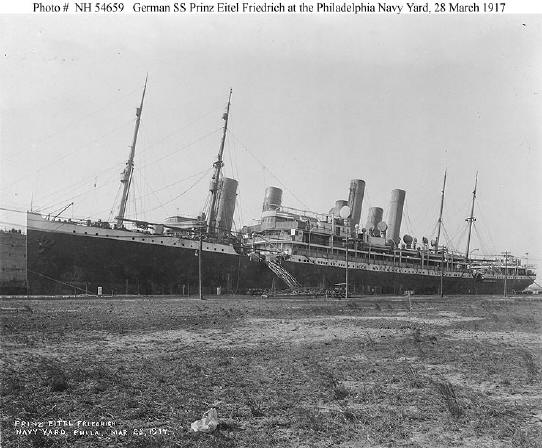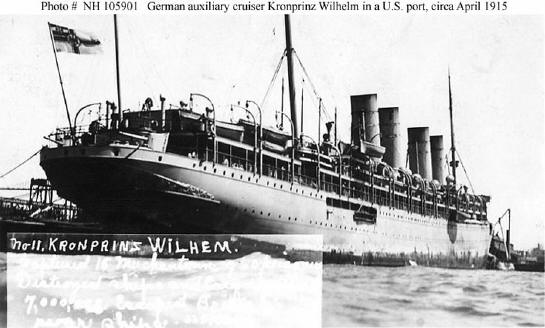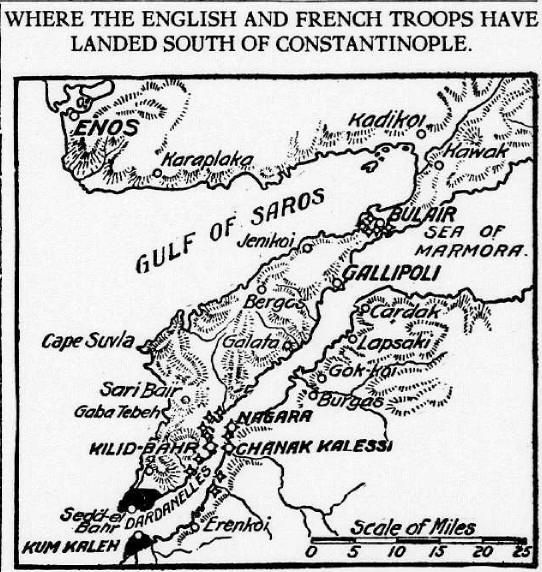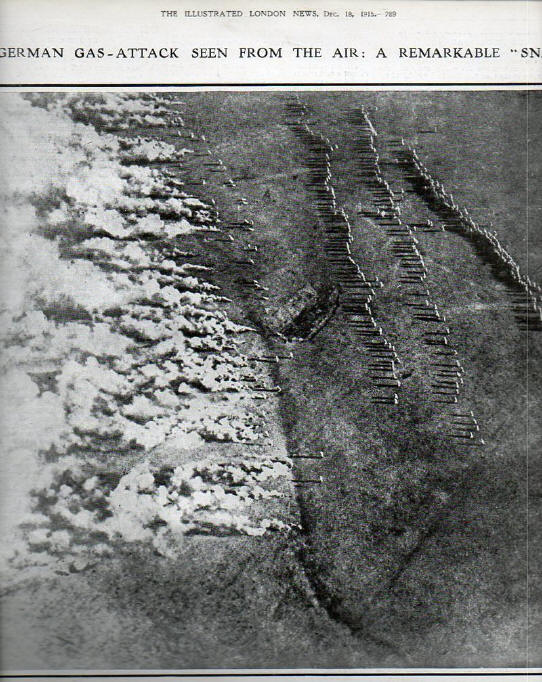April 1915
April 1
The German merchant raider Prinz Eitel Friedrich remains in Newport News guarded by sailors from the battleship Alabama. The shipís captain is now negotiating for supplies sufficient for a trip to the nearest German port, which is permitted under neutrality regulations governing naval vessels of the belligerent nations.

The time limit granted the ship to remain in Newport News has not expired. After the date of expiration the German ship will have 24 hours in which to leave American waters. If in that time a merchant ship of an enemy should leave the harbor, the Prinz Friedrich would be held 24 hours more, in order to give the merchant ship a
head start.
British warships off the Virginia coast are taking no chances of the Prinz Friedrich slipping out to sea at night. They are overtaking and boarding every ship up and down the coast.
The Prinz Eitel failed to cease the opportunity to escape her hunters during the howling gale that drove a blinding snowstorm over the Virginia Capes April 3rd and 4th. The storm drew a curtain between the outside world as it ripped down telephone and telegraph wires, resulting in most of the Virginia coast being entirely cut
off from communications.
The storm made every lane out to sea a comparatively safe route, and many admirers of the German commander, recalling, his daring exploits in seven months of sea roving before he came to Newport News, would not had been surprised if he had accepted the fortunate opportunity the elements afforded.
According to reports ten German submarines are now engaged in carrying out warfare against Allied shipping. The Captain of the German Submarine U-10 received praise in the British press for his handling of recent sinkings. The Captain insisted on waiting until all the members of the crews of ships he was sinking were safely in
small boats before blowing up the ships. He then towed the crews towards the coast until they encountered fishing craft, which brought the men ashore. The crews said the commander was quite congenial. He supplied hot coffee and tobacco to them, and told them: "We have orders to sink everything. It is war, and England started it. Please don't take my
sinking of your ship personally." "He was a right nice bloke," said one rescued crewman.
The German offensive movement in the northern section of Poland has come to close. The Russians Austrians and Germans are now centering their efforts in the Carpathians, where the Russians are moving down the southern slopes towards the plains of Hungary, and where fighting are the most vicious character has been proceeding
for days. The losses in the Carpathian passes have been enormous for both sides.
The Austrians are said to be throwing every available man into the fight at this point. The Russians assert that they have taken 260,000 prisoners on the Carpathian front since their advance began January 21. The defense of the Carpathians as the last effort Austria-Hungarian can muster and if her troops fail there is nothing
to prevent the Russian invasion of Hungary. Hungry is in a state a fear least the Austro-Hungarian forces fail to check the events of the Russians.
The Russian success are so menacing that the Germans are hastening reinforcements to the aid of their hard-pressed allies. Germany is said to be moving soldiers from Belgium. Should Russia succeed in completely routing the Austrian armies and thereby gain a victory, which in all probability would hasten the end of the war by
eliminating Austria as of potent factor, it would enhance the possibility of the Western allies in their proposed spring drive towards Berlin.
The internal situation in the dual monarchy is increasingly grave. Opposition to a continuation of the war is said to be growing stronger among the lower classes, which are suffering most from the scarcity of food. Violent antiwar demonstrations are reported to have occurred in several cities
An effort by Austria to conclude a separate peace is considered highly improbable as the military organization of the dual monarchy is in the hands of Germany. Austria, represents so a large a contingent of men and materials diverting the Russian avalanche from Germany, Germany might permit negotiations only if she desired
them to be the first step towards a general peace.
Russian and Turkey have emphatically asserted that there was no foundation to the reports that the countries are negotiating a separate peace treaty. The Russianís said they would never peace especially when they were on the eve of realizing the oldest Muscovite ambition of gaining control of the Dardanelles.
30,000 British and French troops have landed on the island of Lemnos near the entrance to the Dardanelles. An article appearing in a Constantinople newspaper says the reason for the British occupation was to ensure that if the English were unable to reach Constantinople before the Russians, occupying the island will allow the
British to control the southern entrance to the Dardanelles and thus be able to checkmate Russia in the future.
In the West, conditions bordering on stagnation prevail. The allies are keeping the Germans in the dark as to when and where their big spring thrust will come.
April 7
The nations now at war have lost 5,950,000 men in the first eight months of the conflict. A loss equal to that would wipe out every male inhabitant between the ages of 18 and 45 years in the District of Columbia, and the states of Maryland, Virginia, Maine, New Hampshire, Vermont, Massachusetts, Rhode Island, Connecticut, New
York, New Jersey, Pennsylvania and Delaware.
A second German cruiser has dashed into Newport News seeking refuge from allied warships chasing after her. Aid to the crippled and exhausted German merchant raider Kronprinz Wilhelm, was immediately extended. 50 tons of fresh water and three-day of supplies of fresh meat, fruit and vegetables for use while in port were taken
aboard.

The navy increased patrols on the James River near the vicinity of the Wilhelm's anchorage to prevent Allied ships from entering the river and sinking the German raider.
Experts from the Newport News Shipyard examined the ship in order to determine repairs necessary to make her seaworthy. It is expected the captain will ask for at least three weeks time to repair the ship. That the Wilhelm is leaking constantly was evidenced by the continuous throbbing of her pumps and also by the fact that
the ship lies low in the water despite lack of cargo.
The fact that the Wilhelm will require considerable attention before she can be a seaworthy may eventually cause her to be interned. Her Captain however, insist that he is anxious to have the ship repaired as quickly as possible, in order that he may renew his merchant rating expedition.
Upon dropping anchor, 61 British officers and men were taken from the Wilhelm and rushed down the river to the British warship HMS Cassandra. The harbor was lined with British merchant ships as the captives of the German raider were released. More then a thousand British sailors lined the decks of the ships and cheered. The
cheers could be distinctly heard in the streets of Newport News.
Evidence that the United States is determined to prevent the departure of merchant ships of belligerent powers so long as the German converted cruiser Prinz Eitel Frederich remains in port was backed up by British agents who said that 25 ships are being held in Newport News, some of them loaded with horses for the Allied
armies.
Port authorities said they are not thinking about internment of the Prinz Eitel Frederich at this moment but are waiting expectantly for the German sea raider to leave the port, now that the allowable time the ship is allowed to stay in Newport News has expired.
Moving out her fastest speed, the Prinz Eitel Frederich could make the 20 miles from her pier to the open sea less than two hours. Their only hope to escape the enemy warships would be for her to round Cape Henry and slipped down the coast well inside the 3-mile limit until the enemy patrol had been passed. Success for such
attempt they asserted could be hoped for only under the cover of darkness. The longer she stays in port, the higher the probability she will be forced into interment.
In the Carpathian mountains, the Russians are bringing up reinforcements to push their attacks. The Russians, who are now fighting on unfavorable ground in the Carpathian, are experiencing the same difficulty in bringing munitions and supplies from the rear that previously beset the Austrians. Deep snow, impassable roads, and
impenetrable forest are said to prevent military operations on a large scale and permit only intermittent fighting in which the Russians are suffering enormous losses, while the difficulty experienced in keeping open communications to the rear increases with every step advanced.
The Russians have some way to go before they reach the plains of Hungary, and the Austrian and German forces are placing every obstacle in their way. The southern slopes of the Carpathianís have been strongly fortified and troops are being poured into the region. It is said there are now 24 Austrian and six German army corps
facing the Russians, and that more are on their way. On the other hand, the Russians are still bringing up reserves, and, according to Austrian reports, they are attacking without regard for loss of human life.
The Russians believe that the German answer to the Russian offensive will be the development of a new front in Poland, but the invasion of Hungary is regarded in Russia as a foregone conclusion, unless the Germans are able to transfer formidable forces a first line troops to stiffen the Austrian armies.
In view of these conditions rumors that Austria is about to conclude a separate peace with Russia is growing more persistence. A special dispatch from Petrograd says that negotiations for a separate peace with Austria are based upon the ceding of the province of Galicia and probably some other territory would be exchanged with
Russia for guarantees of peace.
With the announcement that the allied troops are probably being disembarked along the Turkish coast, the ground assault upon the Dardanelles fortifications, which protects Constantinople, is expected to begin within a day or so.
On the Western front, the French have begun an offensive, but the Germans are making fierce counterattacks. Whole German trenches had been left choked with dead, it is declared. The French advance is being pressed in three different directions. French forces have occupied new ground measuring from several hundred yards to 2
miles deep.
The Italian press has taken up the question of the conditions under which Italy might abandon her neutrality and entered a war. Among the conditions mentioned is a guarantee other possession of the Italian provinces now held by Austria, supremacy in the Adriatic, and a share in the partitioning of Turkey enabling Italy to
protect her interests in eastern Mediterranean.
April 14
Reports from Austrian headquarters describe the four weeks battle in the Carpathian Mountains as the most gigantic in the history of the world, three and a half million men participating. This battle reached a climax several days ago. The Russian offensive was halted and repulsed with the most appalling losses. One
correspondent places these at half a million killed, wounded, sick, or prisoners.
Each day a large number of trains convey the Russian wounded to the interior of Russia. On some days as many as 600 of these trains were used. The field hospitals are overcrowded with wounded and sick, and thousands succumbed without adequate medical attendance. Captured Russian officers described conditions as unbearable.
Russian armies have lost 50,000 killed and 10,000 prisoners in desperate fighting which has been raging since Easter. Berlin reports that the main Russian offensive has been brought to a halt by reinforced Austrian and German armies. The Russian endeavor to get through the passes have been repulsed with heavy losses.
The desire for peace is the overwhelming sentiment noticeable in Hungry the past few days. How absorbed the people are in this idea can be seen in the newspapers, which in almost every issue contains prominent illusions, editorials and expressions of opinion along this line.
For several days there has been scarcely any public speech or statement on the war, or the political situation, which did not touch on the subject. Interestingly, the government newspapers are leading the peace campaign. It is not yet easy however to say what terms would be acceptable officially.
While denying categorically that Austria has made any direct peace advances to Russia, Russian officials here have admitted that peace suggestions have come from the Pope. The Popeís communication merely asked whether if Austria were willing, would Russia enter into negotiations with a view to peace.
The believe is becoming general in Rome that Austria will make a sudden attack upon Italy as soon as she becomes convinced that Italy has determined to intervene in the war.
The Bulgarian Premier has acknowledged the possibility of Bulgariaís impending participation in the war and support of the Triple Entente. This attitude was brought about by German refusal to deliver munitions of war, which Bulgaria has paid for. It is realized, that time is on the side of the Entente powers and the attack on
the Dardanelles has caused all parties to recognize the fact that a change is at hand.
The bombardment of the Dardanelles has resumed. The Turks are building wire entanglements and making other preparations on both sides of the Bosporus against a land attack in case the Russians renewed their assault upon the Bosporus. A rail way is being pushed along the coast for the purposes of carrying guns from place to
place as they are needed.
Berlin official circles are keenly interested in the attitude of Italy, Romania, and Greece which are commonly called the Triple Attendre, and who Berlin believes are waiting for the results of the Dardanelles activities before they chose sides.
There has been considerable criticism in London about the non-interference of British forces with the departure of the Turks from the Suez Canal. Why was no effort made to harass the retreating enemy? To cut off his artillery? To capture his munitions and supplies is the question frequently asked.
But military men generally appear satisfied with the way in which the campaign was managed, pointing out that pursuit of the Turks would have cost the British forces many killed and wounded, while not seriously increasing the losses which the Turks suffered from their retreat across the desert.
From accounts of prisoners the British learned early that the Turks were hoping they would be pursued, and were awaiting the coming of the attacking force in defensive positions out of range of the fire of warships. From these entrenched positions they hoped to rout the British forces and then advanced quickly against the
disorganized army on the canal.
The Turks waited for the expected British attack as long as they dared, lack of supplies finally compelled them to drop back into the desert. Fresh water was a long way behind them, the only local well-yielded brackish water only. The final defeat of Turks, officers say, was due to the desert, and to the British there was no
necessity of risking the trials of a desert march.
In the western front the Allies have done little beyond the consolidation of the positions now in their hands.
German aeroplanes dropped bombs within 30 miles of London. The aeroplanes were shot at by local marksmen, but their aim apparently was poor. The only result of the bombs was the digging of a hole in an orchard.
An exciting 25-mile chase in the air between a French airplane and German machine, in which the French aviator was victorious, has been reported. The German used over 100 quick firing cartridges without doing damage against the wings of the French machine. The 11 shots fired by the French aviators caused the German airplane to
fall. The German officers escape injury but were taken prisoner.
April 21
Repairs on the German auxiliary cruiser Kron Prinz Wilhelm, which has been in Hampton Road for two weeks undergoing repairs to make her seaworthy, have been completed and the ship's is now in a position to attempt to escape the enemy warships lying in wait off the Virginia Capes or give notice that he desires to intern within
the next few days. It is believed that the time limit allowed by the government for repairs to the sea raider expires on Friday or Saturday.
A general German offensive movement is underway along the entire Prussian border. The German advance this time evidently is aimed at the Baltic provinces, which are rich in crops and other food supplies.
Despite torrential rains, the Russians appear to have renewed their attacks in the Carpathian passes. Austrian troops have fortified the entire frontier, with entrenchments made of concrete, behind which have been placed cannon of large caliber.
On April 26, a general attack on the Dardanelles began. The disembarkation of an army of 80,000 men, under cover by the fleet, began on before sunrise at various points on the Gallipoli Peninsula, and despite of serious opposition from the enemy in strong entrenchments protected by barbwire, the landing was completed
successfully.
Official statement regarding the fighting going on all over the peninsula still are very much contradictory as to the successes gain. According to the British war office the Allied troops have succeeded in establishing themselves across the end of the peninsula and that in spite of attacks by the Turks, allied troops are
steadily advancing.
The London Times noted that Great Britain now, with the attack on the Dardanelles in progress, has seven campaigns on her hands, and that the defenses of the Dardanelles promised to be the most costly in men and material, especially, it declares, as blunders made in the spring have deprived the allies of all the advantages of
surprise, and gave the Turks able time to strengthen their defenses.

The Germans are pouring troops into Flanders to press the attack, which at the beginning has forced the allies back. The movement according to reports reaching Holland, has assumed even greater dimensions than those which preceded the battle that raged for more than two weeks in the same region last October, and which ended in
the discomfort of Germans.
The Germans launched the sudden advance after stupefying and killing men in the first trenches with deadly gases. The enemy made use of a large number of appliances for the production of asphyxiating gas. The quantities produced indicates long and deliberate preparations for the employment of the devices contrary to the terms
of the Hague convention.

The asphyxiating bombs used by the Germans in their attack were thrown at numerous points along the 3-mile front. The contents of these missiles was largely chloride, mix with other chemicals. The Germans threw these bombs when the wind was blowing with them in the direction of the French trenches. The fumes caused
uncomfortable breathing and a smarting of the eyes at a distance of nearly 2 miles behind the trenches, and they were so powerful that the Germans had to wait themselves a considerable time before they could occupy the evacuated trenches. The bombs themselves are thrown by means of a hand sling such as boys use when throwing stones
French soldiers who survived the attack are suffering from inflamed bronchial tubes and their eyes are swollen from the poisonous fumes. The men say that as soon as they breathed the noxious gases released by the Germans, they suffered acutely. Their eye stinging in their throats contracting. Some of the French soldiers became
unconscious almost immediately. Others, scarcely conscious, acted on instinct and crawled out of the trenches and staggered away from them.
The connecting trenches were so choked with unconscious solders that many soldiers were compelled to climb over their fallen comrades and make their way towards the rear over the open ground. As soon as the Germans perceived that the French are leaving their trenches they opened up an intense rifle and machine gun fire along
that portion of the front, killing thousands of retreating men.
Asphyxiating gas was also used by the Germans in their attack Monday night against the Belgian positions, but had little effect, because preventative measures have been taken by the Belgians, who had learned of the effects produced by the fumes from reports from the French and the British. The Germans, confident the gases
would prove effective, advanced in compact masses but were greeted with a hail of bullets from the trenches. A furious bayonet charge was then launched by the Belgians and the Germanís retired. Losses are said to have been very heavy on both sides.
Read past editions of News Reports From the Front
Have a newspaper clipping on a event that took place in Emmitsburg?
If so, send it to us at history@emmitsburg.net